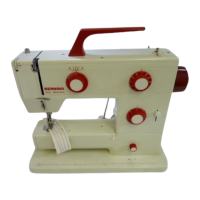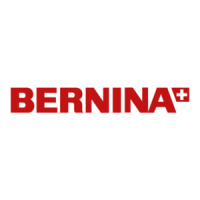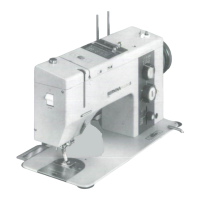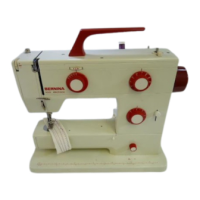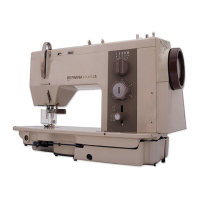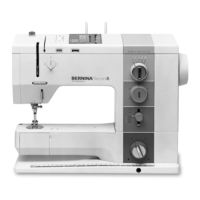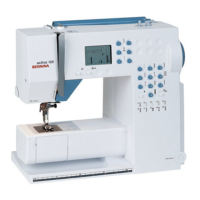Do you have a question about the Bernina 990 and is the answer not in the manual?
Explains the meaning of safety signs and symbols found on the machine, ensuring proper user awareness and adherence to safety protocols.
Details the various parts of the BERNINA 990 machine, including front view, needle area, and bobbin area.
Explains the function of external buttons, left and right controls, display, and multi-function knobs for machine operation.
Lists and describes the purpose of included accessories, such as dust cover, power cable, and various presser feet.
Recommends lubricating the hook before first use or after long periods of non-use for smooth operation.
Provides step-by-step instructions for connecting the power cable and switching on the machine.
Outlines the necessary steps to prepare the machine for sewing, including attaching tables, needles, and threading.
Details the preparation steps for embroidery projects, including inserting the correct stitch plate and needle.
Explains how to select the correct needle thickness and type for different fabrics and sewing projects.
Details how to raise/lower the presser foot and change it, including compatibility checks.
Provides instructions for connecting and removing the embroidery module, emphasizing safe handling.
Explains settings for upper thread tension, sewing speed, securing stitches, and presser foot hover position.
Enables adjustment of stitch length and width for current stitches, alphabets, and buttonholes.
Provides access to stitch pattern editing functions and saving modified patterns as new stitches or defaults.
Displays the status of various functions like WiFi, time, alarm, needle stop, upper thread tension, presser foot, and bobbin thread.
Allows modification of existing stitch patterns or creation of new ones, with functions like draw, move, and edit.
Explains editing functions for stitch width and length, including compatibility checks with presser feet and stitch plates.
Covers adjusting buttonhole length and slit width, with options for recording length, auto length, and manual sewing.
Provides options to save modified stitch patterns as new stitches or with new default settings.
Explains methods for securing the thread at the start of a seam using various options like manual stitches or button presses.
Details options for securing the thread at the end of a seam, including manual stitches, pattern end, and thread cutter functions.
Explains how stitch regulation compensates for varying stitch lengths by adjusting machine speed to fabric movement.
Details the interface for modifying or creating stitch patterns, including tools for undo/redo, stitch information, and selection options.
Explains various editing functions for stitch designs, such as draw, move, view, duplicate, mirror, and invert.
Details the status bar icons for WiFi, time, alarm, upper thread tension, presser foot, hoop, and stitch plate.
Covers editing functions like move, rotate, resize, duplicate, mirror, and stitch density for selected layers.
Explains how to save modified embroidery designs in the Personal Folder or on a USB stick.
Allows modification of common settings for optimal stitchout quality before starting, covering hoop, stitch plate, presser foot, and quilt settings.
Details the stitchout screen features, including design preview, color bar, high speed, and stitch adjustment.
Covers updating machine firmware, resetting settings, deleting personal data, and saving/transferring data via USB.
Provides recommended maintenance intervals and tasks, including cleaning the machine, feed dog, hook, and thread catcher.
Explains the importance of lubricating the hook for smooth machine operation and provides step-by-step instructions.
Addresses problems with the automatic needle threader, such as not threading, incorrect position, or dirt.
Troubleshoots problems with stitch regulation not reacting correctly, often due to dust or thread residue.
Troubleshoots skipped stitches caused by incorrect needles, blunt needles, or poor needle/thread combinations.
Covers troubleshooting steps for the machine not starting, including power connection and temperature issues.
Addresses causes of needle breakage, such as incorrect insertion, fabric pulling, or thick fabric issues.
Troubleshoots upper thread breaks due to incorrect threading, poor thread quality, or damaged stitch plates.
| USB Port | Yes |
|---|---|
| Wireless Connectivity | Yes |
| Automatic Thread Cutter | Yes |
| Knee Lifter | Yes |
| Type | Sewing and Embroidery Machine |
| Maximum Sewing Speed | 1000 stitches per minute |
| Display | Large color touchscreen |
